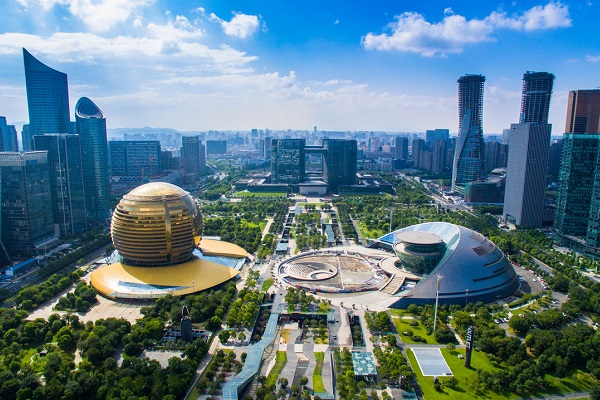Hangzhou drives cross-provincial data exchange in Yangtze River Delta region

A bird's-eye view of the China Data Valley in Hangzhou. [Photo/WeChat account: gh_eef896d92669]
Hangzhou is pioneering a new model of cross-provincial data trading as part of efforts to build a digital Yangtze River Delta region.
At the Hangzhou Data Exchange, datasets from cities like Nanjing — ranging from public transit to parking and weather — are being made available to enterprises across the region.
Over 15 percent of China's data-related companies are located in the Yangtze River Delta region, and Hangzhou is leveraging its digital economy strengths to build a unified data trading ecosystem. Since its launch in 2023, the Hangzhou Data Exchange has operated as a data marketplace, offering everything from autonomous driving simulation data to climate models.
In March 2024, Hangzhou enacted one of China's first local regulations on data trading, clarifying data ownership, usage rights, and encouraging standardized transactions through data rights registration.
To enhance cross-regional collaboration, Hangzhou has set up data service stations in Shaoxing, Lishui, Zhoushan, and Nanjing. It has also achieved mutual data product recognition with the Nanjing Data Exchange.
Provincial-level cooperation is expanding too — Jiangsu, Zhejiang, Anhui, and Shanghai have signed agreements to integrate public services and enable cross-border digital access to certificates and records.
According to the Digital Yangtze River Delta Development Report (2024), the region's digital economy now exceeds 12 trillion yuan ($1.67 trillion), accounting for 30 percent of China's digital output. Hangzhou plans to take this momentum global, with new policies supporting cross-border data flow and an upcoming international version of its data exchange platform.

Hangzhou Data Exchange was unveiled in 2023. [Photo/WeChat account: gh_db4f9255375d]
-
Visionary Pathway - Hangzhou Playbook
July 15, 2025



